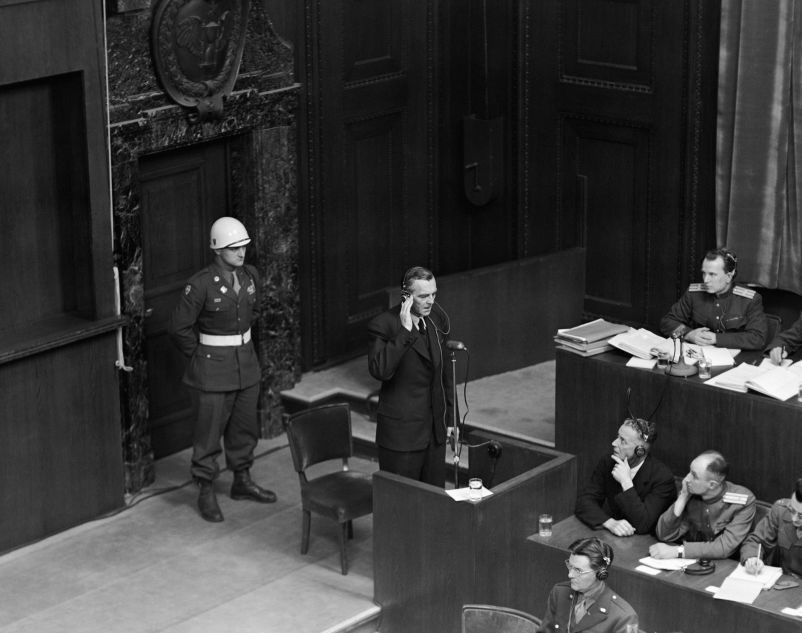A sudden appearance by the captured German field marshal caused an uproar in the courtroom. The Tribunal heard first-hand about the preparations for the attack on the Soviet Union that was to be carried out in the autumn of 1940.
The centrepiece of the 11 February session was the interrogation of the former commander of the Wehrmacht's 6th Army, Field Marshal Friedrich Paulus, who confirmed that the attack on the Soviet Union had been prepared in advance and was not “pre-emptive” as Nazi propaganda had claimed.
The appearance in Courtroom 600 of the key witness, who was officially declared dead by the Reich, left a shocking impression on contemporaries, and the operation to bring Paulus to Germany from the USSR created legends. This story has been a favourite subject of writers, filmmakers, and researchers for the last 75 years.
How Defence Counsels Fell Into Soviet Prosecution’s Trap
This momentous day began when Colonel Yuri Pokrovsky, Deputy Chief Prosecutor for the USSR, outlined to the Tribunal the circumstances of the Reich's attack on Yugoslavia. Pokrovsky read out the testimony of Colonel-General Alexander Löhr and Field Marshal Friedrich Paulus.
“The minutes of the interrogation of Field Marshal Paulus have been compiled in compliance with all legal standards of procedure applying to such interrogations by judicial organisations in the USSR. (…) These documents, in the USSR, are considered as absolutely official documents, of full probative value, to be submitted to the Tribunal when necessary”, Pokrovsky stated specifying that Paulus was interrogated in person in Moscow on 12 January 1946.
Nikolai Zorya, Assistant Prosecutor, State Counsellor of Justice, 3rd Class (Major General), then turned to the subject of Germany's attack on the Soviet Union. “I think that the testimony of a man like Friedrich Paulus, a former field marshal of the German Army, who, as is known, was directly concerned both in the preparations and in the execution of Operation Barbarossa, can give considerable help in investigating the preparation of this plan”.
The defence believed it had a chance to disavow the prosecution's arguments. Otto Nelte, defence counsel for Wilhelm Keitel, remarked that a photocopy of Paulus' statement had not been officially certified by the Soviet authorities and that the statement itself was not an “an affidavit which could be admitted as evidence”. Zorya recalled that the necessary measures for the originals of all the documents of the Soviet Prosecution, or documents certifying the authenticity of those documents were placed at the disposal of the Tribunal.
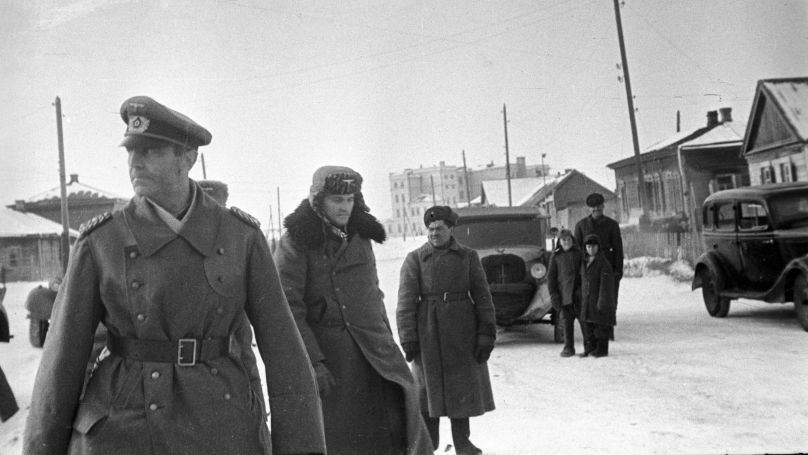
Where Did the Legend of ‘Five Minutes’ Come From?
“The defence team rushed to the court to protest when the Soviet prosecutor tried to read the testimony given by Paulus in Moscow”, Arkady Poltorak, secretary of the Soviet delegation, wrote in his book The Nuremberg Epilogue. “The defence demanded that this witness be brought to Nuremberg and was somehow convinced that R. A. Rudenko would not dare to take such a step. (...) But when the president of the tribunal, Lawrence, who was sensitive protests and requests from the defence, asked 'how General Rudenko looked at the lawyer's request', the unexpected happened. The Soviet chief prosecutor did not need to be asked twice – he agreed straight away. Only people who knew him could’ve noticed something sardonic in his gaze. And when the unsuspecting Lawrence asked him how long it would take to bring the witness in, Rudenko answered calmly, I would even say unusually slowly and somehow even indifferently: 'I think, Your Honour, five minutes at the most. Field Marshal Paulus is in the apartments of the Soviet delegation at Nuremberg’. (…) The statement hit like a bombshell suddenly going off. The defence counsels hurried to withdraw their plea, but an angry Lawrence demanded that Paulus be brought to the court immediately”.
The transcript and the audio recording of the trials do not confirm this beautiful tale. The exchange of remarks was reserved, no one demanded the immediate appearance of Paulus, let alone promised to deliver him in five minutes. It’s true that after the interrogation, Hans Laternser, a lawyer for the Chief of Staff and the High Command of the Wehrmacht, noted that “the witness appeared extremely unexpectedly, at least for the defence”.
Another story, based on the memories of Zorya’s son Yuri, finds no confirmation as well. According to this version, Zorya (we should recall that this talented and principled lawyer would die under mysterious circumstances on 22 May 1946 – he would be found shot dead in his own room) interrogated Paulus until he stated that there would now be presented “materials and testimony of people with reliable information about how preparations for the attack on the Soviet Union actually took place”. Then Zorya’s speech was allegedly cut short, and the Soviet interpreter booths were switched off. The Soviet leadership had ordered that Roman Rudenko interrogate Paulus next.
However, the transcript and the audio recording again tell a different story. Immediately after the lunch break, Zorya announced: “In pursuance to the statement made by the Soviet Delegation, I will ask for permission to bring before the Tribunal for direct examination the field marshal of the former German Army, Friedrich Paulus, who will be examined by the Chief Prosecutor of the USSR, General Rudenko”. After that line, there was indeed a lag in the simultaneous translation, but apparently it was not the reason the prosecutor had been replaced suddenly. Zorya did not interrogate Paulus at all.
Witnesses wrote that Paulus’ appearance in the courtroom caused a commotion in the dock. This is partly confirmed by the video of the examination: the defendants listened to the witness with great interest.
When Germany and its Satellites Prepared to Conquer USSR
First, Paulus confirmed the text of his statement. Secondly, he said that on 3 September 1940 he had joined the High Command of the Army as Chief Quartermaster I of the General Staff. And when he took office he found in his sphere of work, among other things, a “still incomplete operational plan dealing with an attack on the Soviet Union”.
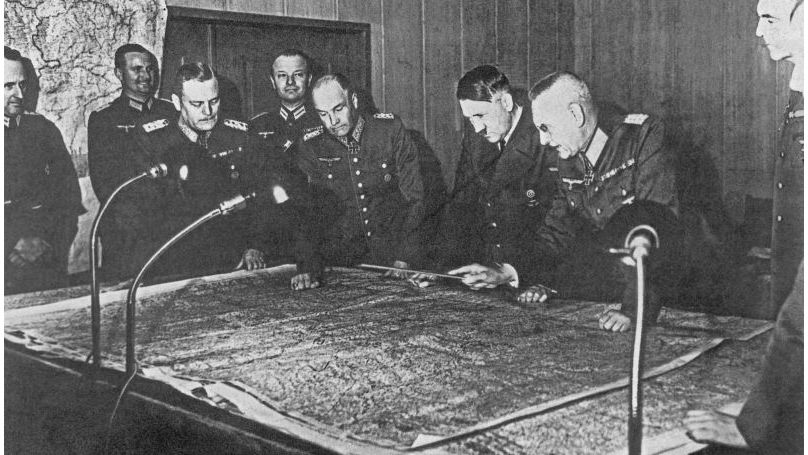
According to the witness, Major General Erich Marx, Chief of the General Staff of the 18th Army, created this operational plan. The Chief of the General Staff of the Army, Colonel-General (Generaloberst) Franz Halder, turned over to Paulus the continuation of the work ordered by the Supreme Command of the Armed Forces, on the following basis:
“An investigation was to be made as to the possibilities of an attack against the Soviet Union, with regard to the terrain, the points of the attack, the manpower needed, and so forth. In addition, it was stated that altogether about 130 to 140 German divisions would be available for this operation. It was furthermore to be taken into consideration that from the beginning Romanian territory was to be utilised for the deployment of the German Southern Army. On the northern flank, the participation of Finland in the war was taken into account, but was ignored in this operational plan of the army”.
According to the witness, the objectives of the operation were: “First, the destruction of those parts of the Russian Army stationed in the west of Russia, to prevent the units which were fit for fighting from escaping deep into Russia; second, the reaching of a line from which the Russian Air Force would be unable to attack German territory effectively, and the final aim was the reaching of the Volga-Archangel line”. This work had been completed in early November 1940 and culminated in two war games led by Paulus on behalf of Halder.
“In connection with these military exercises and for the evaluation of the theoretical experience gained therefrom, there was a further conference of the Chief of the General Staff of the Army and the chiefs of the general staffs of the army groups which had been planned for the East. And further, in connection with this conference, there was a speech about Russia by the then chief of the section Foreign Armies East, Colonel Kinsel, describing Russia's geographic and economic conditions, the Red Army, et cetera.
The most significant point here was that no preparations whatever for an attack by the Soviets had come to our attention”,
- Paulus stressed. “(…) Immediately thereafter, that is on 18 December 1940, the Supreme Command of the Armed Forces issued Directive Number 21. This was the basis for all military and economic preparations that were to be carried out”.
The witness noted that “for the beginning of the attack, the Supreme Command of the Armed Forces had calculated the time that would make it possible for large troop movements to be made on Russian territory”. At first, the invasion was planned for May, but at the end of March Hitler made a change in the plan and decided to attack Yugoslavia. “(…) the preparation for this attack on the Soviet Union, which actually took place on 22 June 1941, dated back to the autumn of 1940”, Paulus concluded.
In doing so, he refuted the thesis that the German attack was "pre-emptive", intended only to prevent aggression by the Soviet Union against the Reich. This idea had been promoted by Nazi propaganda since 22 June 1941, when Adolf Hitler said in an address to the German people:
“National Socialists!
You probably all felt that this was a bitter and difficult step for me. The German people have never had hostile feelings toward the peoples of Russia. During the last two decades, however, the Jewish-Bolshevist rulers in Moscow have attempted to set not only Germany, but all of Europe, aflame. Germany has never attempted to spread its National Socialist worldview to Russia. Rather, the Jewish-Bolshevist rulers in Moscow have constantly attempted to subject us and the other European peoples to their rule. They have attempted this not only intellectually, but above all through military means”.
The witness also revealed the role Nazi Germany had assigned to its satellites. In particular, Paulus was instructed to negotiate with the Hungarian military about their participation in the attack on Yugoslavia. This was successfully executed, with a group of Hungarian forces established on the border with the USSR.
Since December 1940, the Third Reich had been negotiating with Finland. In the second half of May, the parties agreed that in the event of an attack on the USSR, “Finnish troops in the south were to synchronise their movements with the advance of German Army Group North and likewise that the joint advance later against Leningrad should be subject to consultations and agreements depending on the development of events”.
How Germany Diverted Attention from Plan to Attack Russia
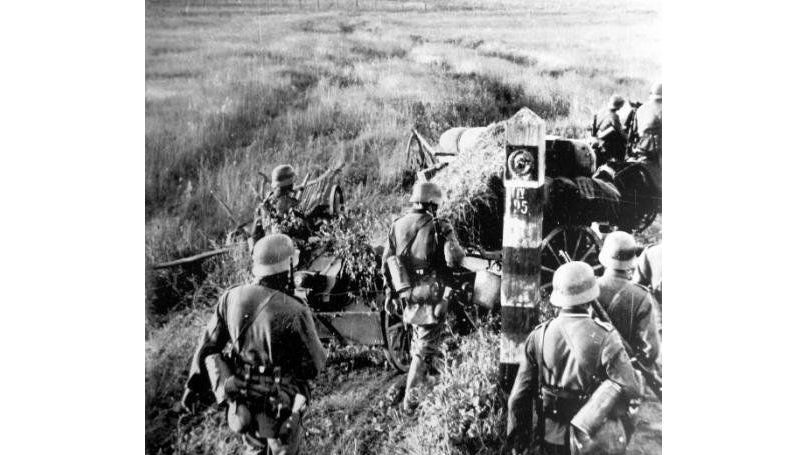
Paulus said that the attack on the Soviet Union took place after extensive preparations according to a plan prepared carefully and well in advance. The troops that were to carry out the attack were positioned deep in the strategic bridgehead then were withdrawn under special orders in stages to their initial positions and simultaneously advanced along the entire front line.
“A large-scale diversion, which was to be organised in Norway and along the coast of France, was designed to simulate an invasion of Britain in June 1941 and thus divert Russia's attention”, the field marshal testified.
“All measures were taken not only for operational but also for a tactical surprise, as for instance, the prohibition of open reconnaissance on and across the boundary before the beginning of the war. That meant, on the one hand, that possible losses which might be caused due to the lack of reconnaissance had to be taken into account for the sake of surprise, but on the other hand, it meant that a surprise attack across the boundary by the enemy was not feared”, Paulus pointed out.
“The aim to reach the Volga-Archangel line, which was far beyond German strength, is in itself characteristic of Hitler's and the National Socialist leadership's boundless policy of conquest. (…) How much Hitler was bent on taking economic objectives in this war can best be shown from an example out of my personal experience”, the general said. “On 1 June 1942, on the occasion of a conference of commanders-in-chief in the region of Army Group South in Poltava, Hitler declared:
‘If I do not get the oil of Maikop and Grozny, then I must end this war’”.
The high witness named defendants Wilhelm Keitel, Alfred Jodl, and Hermann Göring as being among the active participants in unleashing the war of aggression against the Soviet Union,
“Have I rightly concluded from your testimony, that long before 22 June the Nazi government and the Supreme Command of the Armed Forces were planning an aggressive war against the Soviet Union for the purpose of colonising the territory of the Soviet Union?”, Rudenko interrogated. “That is beyond doubt according to all the developments as I described them, and also in connection with all the directives issued in the well-known Green File”, Paulus concluded.
Why Paulus Became Anti-Fascist
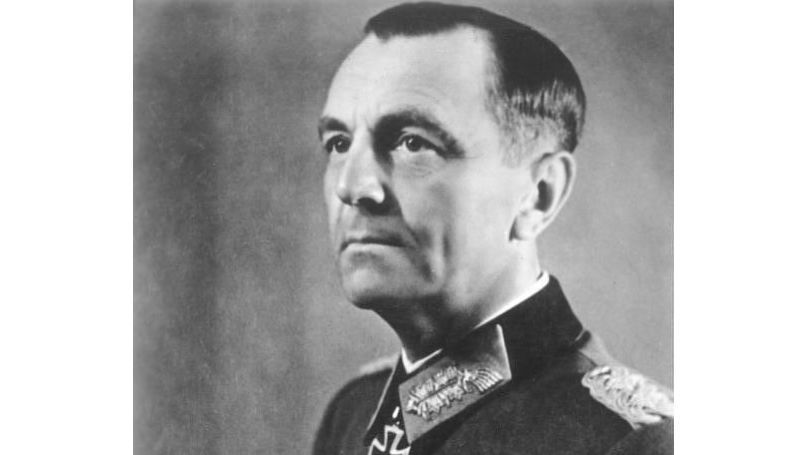
The next day, the defence cross-examined Paulus, but the defence counsels were unable to trap him in contradictions. The general gave no answer about the number of Soviet troops along the borders with Germany and Romania that might have been indicative of the Soviet Union’s aggressive plans. He also dispelled rumours that he taught at a military academy in Moscow or held any position in the Soviet Union - such a fact would suggest that his testimony was unscrupulous and biased.
Paulus has confirmed that he was a member of the German Freedom Committee, “a movement of German men, soldiers of all ranks, and men of all classes, who had made it their aim to warn the German people at the last moment from the abyss, and to arouse them to overthrow this Hitler regime which had brought all this misery to many nations and especially to our German people”. But at the same time, he stressed that he had not engaged in anti-Nazi propaganda until 8 August 1944, when he signed the relevant proclamation.
That date was no coincidence. Paulus surrendered on 31 January 1943 during the Battle of Stalingrad when his army was surrounded. Stalingrad was fundamentally important to the course of the war, so Hitler, already knowing that the “cauldron” could not be unblocked, ordered Paulus not to retreat or try to break the ring, but to fight “to the last soldier and the last bullet”. To boost the morale of the unit, many officers were awarded Iron Crosses, and the commander himself was promoted to Field Marshal. “Not one German field marshal has ever been taken prisoner”, the Führer addressed Paulus.
The army, left without ammunition, fuel, and food, chose captivity over death.
Hitler became enraged, declared everyone dead and staged a lavish funeral ceremony for Paulus in an empty coffin.
But even in captivity, Paulus refused to cooperate with the Soviets for a long time. The defeat of Germany and especially the failed “20 July plot” by generals (a military mutiny against Hitler on 20 July 1944, whose participants included friends of the field marshal) forced him to change his mind. Paulus was shocked by how brutally the Nazis dealt with the conspirators – prominent German officers.
Expert Commentary
Andrei Gorbunov, a historian and methodologist at the Victory Museum:
“His Testimony Left No Room For Defendants to Whitewash”
Friedrich Paulus was the first field marshal of the Third Reich to be taken prisoner. This fact becomes more valuable when one realises that he surrendered to the Red Army in February 1943, when it was still unclear when and how the war would end. The entire top German brass was taken prisoner only at the very end of the war, and Paulus in the middle of it, a unique case in itself.
Paulus was a talented staff officer and a good army commander. He was a Nazi and gave up the idea only in August 1944, when everyone already understood that Germany had lost the war. That's why Paulus abandoned Nazism – he was smart and understood that nothing good awaited the Nazis after the victory of the anti-Hitler coalition.
On 8 August 1944, Paulus signed an appeal "To the German prisoners of war, soldiers and officers, and to the German people". One of the statements from it said: “I consider it my duty to declare that Germany must remove Adolf Hitler and install a new state leadership that will end the war and create the conditions to ensure our people's continued existence and the restoration of peaceful and friendly relations with the present enemy”.
Afterwards, he first joined the “League of German Officers” and later the “National Committee for a Free Germany”. The role of Paulus was enormous: not only did he write proclamations and speak on the radio, but he also signed leaflets that were dropped into the German trenches.
Paulus was one of the architects of “Operation Barbarossa”, the plan to attack the Soviet Union. As a witness for the prosecution at the Nuremberg trials, he revealed a very important fact from the rostrum – aggression against the Soviet Union had been carefully and comprehensively prepared. His speech left the defendants with little or no chance of whitewashing themselves.
The defendants called him a traitor and Göring went into hysteria.
We are grateful to Sergei Miroshnichenko, a lawyer and international law scholar, for his assistance in preparing the material.
Sources:
Nuremberg Trials Stenograph. Volume VI, Second Edition (2019). Translated from English by Sergei Miroshnichenko.
‘The Nuremberg Epilogue’ by Arkady Poltorak
‘Two Graves of Paulus’ by Alexander Zvyagintsev
‘Zorya’s Report’ by Krystyna Kurczab-Redlich
